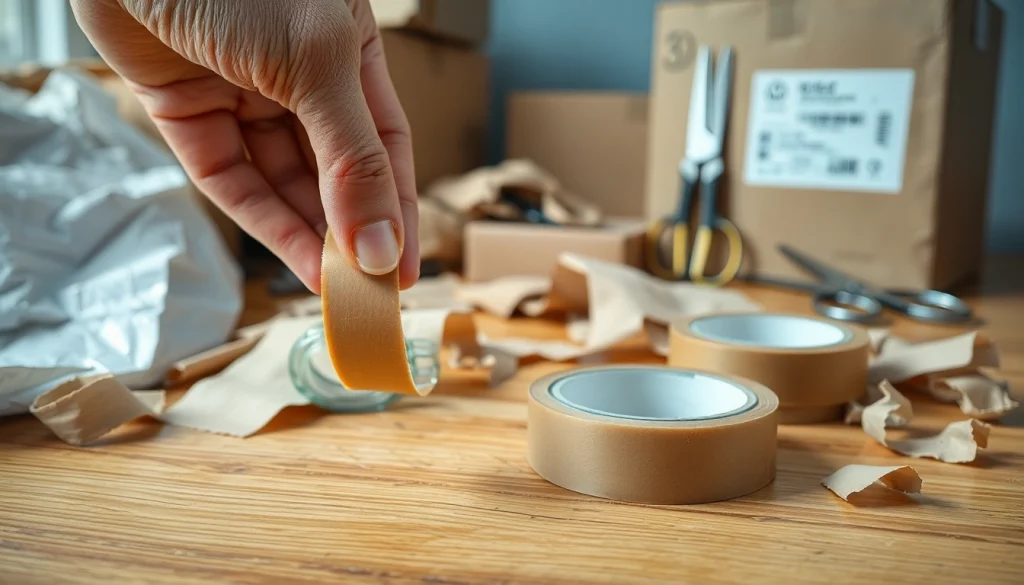Why Choose Recyclable Tape for Your Eco-Friendly Packaging Needs?

Understanding Recyclable Tape: An Eco-Friendly Option
As sustainability becomes a central theme in modern commerce, companies and consumers alike are searching for environmentally friendly alternatives to traditional packaging solutions. One such alternative gaining traction is recyclable tape. This tape not only fulfills practical packaging requirements but also aligns with growing consumer demand for eco-conscious products. In this deep dive, we explore the nature of recyclable tape, its benefits, environmental impact, and practical applications.
What is Recyclable Tape?
Recyclable tape refers to adhesive products made from materials that are capable of being processed and reused after their initial use. Unlike conventional plastic tapes that contribute significantly to landfill waste, recyclable tapes are composed of paper, bioplastics, or plant-based alternatives, designed to break down safely in recycling systems. Understanding the composition and functionality of recyclable tape is crucial for both consumers and businesses aiming for sustainable practices.
Types of Recyclable Tape Available
The market offers a variety of recyclable tape types that cater to different needs:
- Kraft Paper Tape: Made from durable kraft paper and typically featuring a natural rubber adhesive, this tape is strong and biodegradable. It’s an excellent choice for general packaging applications.
- Water-Activated Tape: Often used for carton sealing, this tape is activated by water, which makes it adhere strongly to boxes. It is made from paper and does not contain harmful coatings, making it recyclable.
- Compostable Tape: Composed of plant-based materials, compostable tape decomposes under appropriate conditions, making it suitable for compost heaps while providing good adhesion for packaging.
Benefits of Using Recyclable Tape
Adopting recyclable tape presents numerous advantages for both consumers and businesses:
- Environmental Responsibility: Using recyclable tape minimizes plastic waste and aligns with sustainable business practices, appealing to eco-conscious consumers.
- Compliance and Certification: Many recyclable tapes are certified by reputable environmental organizations, assuring users of their sustainability claims.
- Effective Packaging: Recyclable tapes can provide the same level of adhesion and durability as traditional tapes, without compromising performance.
- Brand Loyalty: Companies that visibly employ sustainable practices often attract a dedicated customer base willing to support eco-friendly alternatives.
The Environmental Impact of Recyclable Tape
The environmental benefits of recyclable tape extend beyond mere waste reduction. Detailed understanding of these impacts provides a strong argument for its adoption.
Reduction of Plastic Waste
Plastic pollution remains one of the critical challenges facing the environment today. The use of recyclable tape significantly reduces the amount of plastic entering landfills and oceans. Traditional plastic tapes can take centuries to decompose, leading to long-term environmental damage. In contrast, recyclable tapes, particularly those made of paper, break down much faster, facilitating sustainable waste management practices.
Biodegradability and Compostability
While recyclable tape can be processed in recycling systems, some variants, such as compostable tape, offer the benefit of biodegradability. This means that under the right conditions, these tapes can return to the earth and provide nutrients for soil, rather than contributing to pollution. This feature is especially vital as more consumers embrace organic waste recycling initiatives.
Recycling Processes Explained
The recycling process for tape is generally straightforward yet critical to the overall effectiveness of sustainability efforts. Depending on the composition, recyclable tape can be processed through municipal recycling streams or specialized facilities. Some key elements of the recycling processes include:
- Sorting: Tapes must be sorted from other materials. Many tapes, especially those with plastic backing, can contaminate recycling streams.
- Shredding: Once sorted, recyclable tapes are shredded into smaller pieces, making them easier to process and remanufacture.
- Pulping: The shredded materials are mixed with water to create a pulp, which is then processed into new paper products.
How to Use Recyclable Tape Effectively
While adopting recyclable tape is a step towards sustainable packaging, effective usage maximizes its benefits. Understanding best practices can enhance functionality and ensure optimal outcomes.
Best Practices for Application
When applying recyclable tape, consider the following best practices:
- Surface Preparation: Ensure that the surfaces to be taped are clean and dry for the best adhesion.
- Proper Technique: Apply the tape in a straight line, with even pressure to create a strong seal.
- Overlap Methods: For larger packages, overlapping tape can offer additional support. Ensure that the edges are sealed to prevent exposure.
Storage and Handling Tips
Storage conditions can impact the performance of recyclable tape substantially:
- Avoid Moisture: Store tape in a dry area to prevent the adhesive from becoming ineffective or the tape itself from degrading.
- Temperature Control: High temperatures can affect adhesive properties, so keeping tapes in a temperature-controlled environment is advisable.
Common Mistakes to Avoid
To ensure the longevity and effectiveness of recyclable tape, it’s essential to avoid these common pitfalls:
- Improper Disposal: Throwing recyclable tape into regular trash instead of the correct recycling bin negates its environmental benefits.
- Mixing Materials: Avoid using recyclable tape with plastic or mixed-material products if you want to recycle effectively.
Comparing Recyclable Tape with Traditional Options
A careful comparison between recyclable tape and traditional options reveals key differences that can influence purchasing decisions.
Performance: Strength and Durability
In terms of bonding strength, recyclable tape can compete with traditional plastic options. Many modern recyclable tapes are designed to meet rigorous performance standards, capable of supporting heavy packages. The durability of recyclable tape also means it remains effective over time, providing a reliable sealing solution for various applications.
Cost Considerations
The cost of recyclable tape may be slightly higher than traditional tapes due to the materials used and sustainable production methods. However, through a holistic viewpoint that considers environmental costs, recyclable tape often presents the more economical choice in the long term.
Environmental Trade-offs
When comparing recyclable tape and traditional plastic tapes, a significant trade-off surfaces: the choice between convenience and sustainability. While traditional tapes may offer ease of use and lower costs, they contribute to environmental degradation. On the other hand, recyclable tape promotes sustainability, aligning with consumer demands for eco-friendly practices, making it a worthy investment.
Where to Buy Recyclable Tape
Purchasing recyclable tape has become increasingly straightforward, given the rise of eco-friendly product retailers and online platforms. Choose well-established sources to ensure the quality and performance of your tape.
Top Retailers Offering Sustainable Options
Several retailers specialize in eco-friendly packaging solutions, providing a range of recyclable tape options. These retailers often emphasize sustainability and transparency in their sourcing practices, making them ideal choices for consumers looking to purchase recyclable tape.
Online vs. Local Purchasing
When deciding between online and local purchasing of recyclable tape, consider factors such as convenience, shipping times, and availability. While online shopping provides broader choices, supporting local businesses also contributes to the community and reduces shipping emissions.
What to Look for When Shopping
To ensure you buy the best recyclable tape, consider these attributes:
- Material Composition: Look for tape made of renewable resources, such as kraft paper or plant-based materials.
- Certifications: Check if the tape has certifications verifying its recyclability or compostability.
- Reviews and Ratings: Customer feedback can provide valuable insights into tape performance, adhesive strength, and overall satisfaction.
As more businesses and consumers move towards adopting sustainable products, recyclable tape stands out as a crucial tool in eco-friendly packaging strategies. By understanding its benefits and applications, individuals and organizations can significantly enhance their environmental impact while maintaining product integrity. The move towards recyclable tape is not just a trend but rather a necessary step towards a more sustainable future.






